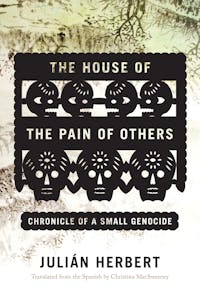The House of the Pain of Others
Chronicle of a Small Genocide
 Download image
Download image
ISBN10: 1555978371
ISBN13: 9781555978372
Paperback
304 Pages
$16.00
CA$21.00
Early in the twentieth century, amid the myths of progress and modernity that underpinned Mexico’s ruling party, some three hundred Chinese immigrants—close to half of the Cantonese residents of the newly founded city of Torreón—were massacred over the course of three days. It is considered the largest slaughter of Chinese people in the history of the Americas, but more than a century later, the facts continue to be elusive, mistaken, and repressed.
“And what do you know about the Chinese people who were killed here?” Julián Herbert asks anyone who will listen. An exorcism of persistent and discomfiting ghosts, The House of the Pain of Others attempts a reckoning with the 1911 massacre. Looping, digressive, and cinematic, Herbert blends reportage, personal reflection, essay, and academic research to portray the historical context as well as the lives of the perpetrators and victims of the “small genocide.” This brilliant historical excavation echoes profoundly in an age redolent with violence and xenophobia.
Reviews
Praise for The House of the Pain of Others
“[The House of the Pain of Others] is both vivid and enthusiastically researched, examining each piece of available evidence to establish what must have happened at every stage and how it was obscured, then and later.”—Harper’s
“The strengths of Herbert’s writing are patent throughout: his vast, comprehensive research; his often elegant phrases and sentences . . . ; his empathy; and his determination to be accurate and fair . . . A grim, complex and admonitory account of a deeply racist episode that many would rather forget—or ignore.”—Kirkus Reviews

